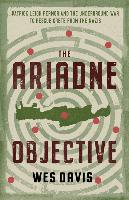"Wes Davis' fast-paced tale of wartime sabotage reads more like an Ian Fleming thriller than a mere retelling of events."
Wall Street Journal
"The story unfolds with the rich characterization and perfectly calibrated suspense of a great novel. It can be hard at points to remember the book is actually a work of nonfiction."
Christian Science Monitor
The Ariadne Objective is the extraordinary story of the Nazi occupation of Crete told from the perspective of an eccentric band of British gentleman spies. These amateur soldierswriters, scholars, archaeologistsincluded Patrick Leigh Fermor, a future travel-writing luminary; John Pendlebury, a pioneering archaeologist whose walking stick concealed a sword; Xan Fielding, who would later translate books like Bridge over the River Kwai and Planet of the Apes into English; Sandy Rendel, a future Times of London reporter; and W. Stanley Moss, who would write up his account of their exploits in Ill Met By Moonlight (Paul Dry Books, Inc.).
Alongside Cretan partisans, these British intelligence officers carried out a daring plan to sabotage Nazi maneuvers, culminating in a high-risk plot to abduct the island's German commander. Wes Davis presents the scintillating story of these legends in the making and their adventures in one of the war's most exotic locales.
Includes 17 black and white photographs.

